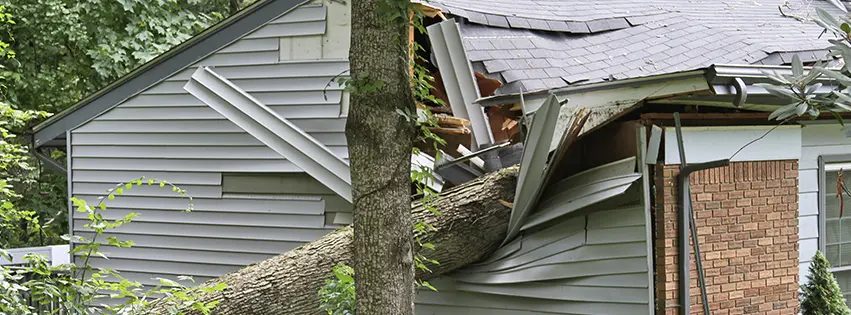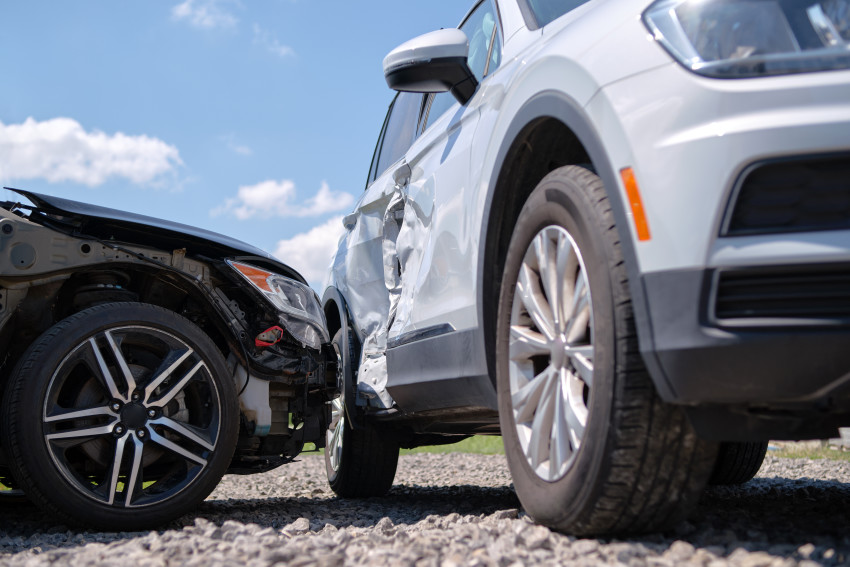
Fallen Tree Damage: What To Know
If you've lived in Tennessee for any length of time, you know trees are basically everywhere. They're a defining part of our state's topography. And because trees are so common here, it can be easy to take them for granted.
We may not realize it, but trees are a vital part of our environment. They provide shade, stabilize soil, supply oxygen, and increase property values. In fact, according to the USDA Forest Service, air conditioning costs can be reduced by as much as 56% by strategically placing trees near a house.
Trees offer us numerous benefits, but sometimes they do cause inconveniences for us. Like any other plant, they require occasional maintenance. But unlike many other plants, trees are very large and heavy. When trees fall in residential areas, they sometimes fall on fences, sheds, garages, and houses. When one of your trees falls on your neighbor's property, one question many people don't think about until it happens is, "Who files the claim?"
Our agents get this question and others like it several times a year. Below are a handful of the most common questions our agents answer on this subject:
My Tree Just Fell On My Property. What Should I Do First?
In this case it's best to call your agent immediately to let them know what happened. If your agent is unavailable or offices are closed, first take photographs of the tree damage. If the fallen tree caused a hole in the roof, tarp or patch it as soon as possible to prevent further damage to the interior of your home.
Common covered perils related to tree damage may include:
Storms and severe weather conditions:
coverage is often provided for tree damage caused by windstorms, tornadoes, and heavy thunderstorms.
Lightning strikes:
if a tree is struck by lightning and subsequently causes damage to your property, it is generally considered a covered peril.
Weight of ice and snow:
if a tree collapses under the weight of ice or snow and causes damage, it may be covered by your policy.
What If The Tree Didn't Cause Damage?
If a tree falls and does not damage any property, there is no need to file a claim since no property was damaged. You'll just need to safely break up the tree and haul it off somewhere to keep it from killing your lawn.
What If My Tree Falls On My Neighbor's Property?
In this case, many people often assume that since it is their tree that fell down, they should file a claim on behalf of their neighbor; however, claims should only be filed by the property owners. Even if your neighbor's garage is hit with your tree, it's still their claim. Offering to help with the tree removal and/or their deductible is a nice gesture, but it is not required.
My Neighbor's Tree Fell On My Property. Who Files The Claim?
If your neighbor's tree damages your property, it would be your responsibility to file the claim. Courts have decided in these circumstances that the owner of the tree is not necessarily responsible for damages caused by the tree. A factor that could change this would be if the tree owner knew in advance that their tree was dying or could fall over and damage someone's property but did not act in good faith to fix the problem in advance.
Put simply, the property owner bears the responsibility of looking after the security of their own property. However, since property owners can't remove trees owned by their neighbors, they are responsible for notifying their neighbors of dead or dying trees that may fall on their property. In cases where a person lets their neighbors know proactively before a tree falls, responsibility is often assigned to the neighbor rather than the property owner.
Am I Allowed To Remove Boundary Trees?
Boundary trees are trees with trunks that are situated on the property line between two adjoining landowners. Boundary trees are quite common and rarely pose a problem for property owners. If you'd like to get rid of a boundary tree for any reason, you must first consult with the neighbor since you are both co-owners of the tree. In many cases, the two property owners are able to come to a mutually beneficial decision without involving a third party.
Does Homeowners Insurance Cover Removal Of Tree Debris?
In most cases, homeowners insurance covers the removal of tree debris if a fallen tree damages a covered structure like your house, garage, or fence. However, it's important to note that if the tree fell without causing any damage to a structure, the cost of removing the debris is typically not covered by homeowners insurance. Coverage and limitations can vary depending on your specific policy, including potential limits on coverage or a separate deductible for debris removal. To fully understand your coverage, it's recommended to review your homeowners insurance policy or consult with your Farm Bureau Insurance of Tennessee agent. They can provide the necessary information and help clarify any questions you may have.
How Much Does Homeowners Insurance Cover For Tree Removal?
Homeowners insurance policies can have specific limits for tree removal expenses, such as a percentage of your dwelling coverage or a set dollar amount. Some policies may also require a separate deductible for tree removal. To understand your coverage and any limitations regarding tree removal expenses, review your policy or contact your local agent. They can provide the necessary information to help you determine the extent of your coverage.
Will Homeowners Insurance Cover Cutting Down A Tree?
Homeowners insurance generally does not cover the cost of cutting down a tree for preventive or maintenance purposes. Its main focus is on providing coverage for sudden and unexpected perils like storms or accidents that result in property damage. If you're planning to remove a tree as a precautionary measure or for maintenance, it's unlikely that your insurance policy will cover the expenses.
A Tree Fell On My Car. Does My Homeowners Policy Cover The Damage?
Homeowners insurance typically does not cover damage to your car if a tree falls on it. For such cases, you usually need comprehensive auto insurance to address the resulting damage. It's important to review your auto insurance policy or contact your local agent to ensure you have the appropriate coverage for your vehicle and understand any applicable deductibles.
Protect Your Home with Farm Bureau Insurance of Tennessee
If you're not yet a Farm Bureau Insurance customer, we make it easy to get connected with your local agent no matter where you are in Tennessee. Contact Farm Bureau Insurance today, or visit your local agent to discuss your options.
Tennessee Insurance: Read More

What is an Auto Deductible?
October 9, 2024
When it comes to auto insurance, understanding the terminology is crucial to making informed decisions about your coverage. One term that often comes up in discussions about car insurance is the “auto deductible.” Read more

What Is Business Insurance?
December 10, 2024
Whether you are a small business owner or a seasoned entrepreneur, having the right insurance coverage is crucial to protect your assets and mitigate various risks. In this article, we aim to provide you with an in-depth understanding of what business insurance is, its significance, and how it can contribute to your company's success. Read more

What's The Difference Between Term and Whole Life Insurance?
May 31, 2024
Life insurance is a crucial aspect of financial planning, offering peace of mind and financial security for your loved ones in the face of life's uncertainties. In this article, we'll explore the key differences between these two options. Read more
